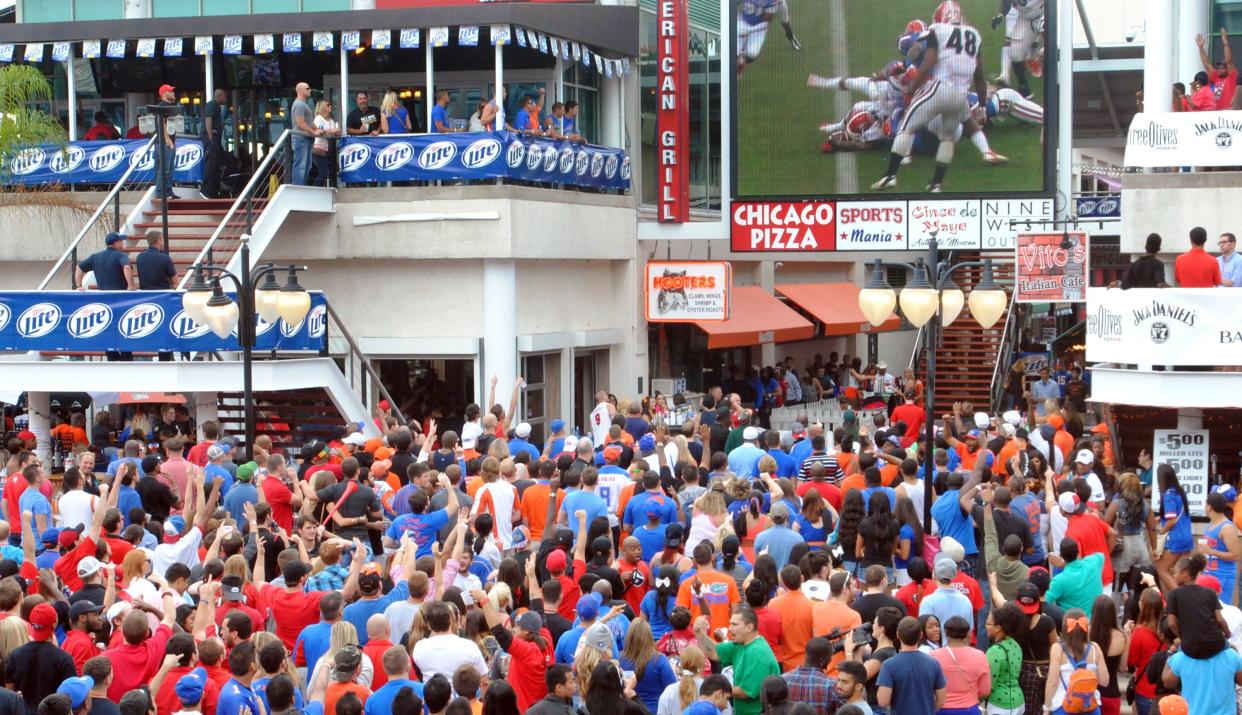Guest columnist: College football is great — hosting Florida-Georgia in Jacksonville is not

- Oops!Something went wrong.Please try again later.
Before you begin reading, I should distinguish myself from the eponymously named Chris Corr who currently serves as president of the University Athletic Association at the University of Florida. I am not this person.
Like much of the population in the continental United States, I am incredibly excited that college football season has begun. Waking up with College Gameday, hearing the familiar chime of the SEC on CBS, having something to talk about with your father-in-law … college football, in many ways, is a godsend.
However, I dread the fourth Saturday in October — an annual date when the Florida Gators play the Georgia Bulldogs.
Notwithstanding my angst as a Gator fan and proud University of Florida alumni of being crushed by Georgia yet again in football, I dread this date because of the location of the Florida-Georgia football game itself.
I grew up in Jacksonville and attended countless Gator football games with my father, making the Saturday morning trip west on U.S. 301 through extensive gameday traffic, ever so sure to be under the speed limit as we drove through Lawtey, Starke and Waldo. This was ritualistic and occurred almost every Saturday during the fall of my childhood — it was amazing.
Of all the games we attended, braving speed traps and the traffic nightmare that is Gainesville on a football gameday, the one game of the season we never attended took place less than 5 miles from our home.
For those who have never attended Florida-Georgia, it’s an ugly affair that resembles more dive-bar deluge than Southeastern Conference football game. I’ve attended Florida-Georgia twice as an adult with my family. We have been physically confronted by fans, verbally accosted by Jacksonville police and witnessed absolute atrocities in the tailgating areas outside the stadium.
Now as a father, I will never expose my children to the grotesque embarrassment that is Florida-Georgia in Jacksonville.

Think about this: Both teams travel over 400 combined miles from their home campuses to play a football game at a smaller venue, without traditional student attendance. They forgo the ability to host recruits on campus, in a city with historically one of the highest crime rates in the country.
For athletic departments that emphasize the student and fan experience at sporting events, hosting the game in Jacksonville defies logic.
As the Jaguars prepare for major stadium renovations that will prevent football from being played at EverBank Stadium, a golden opportunity to move Florida-Georgia out of Jacksonville sits before both Florida and Georgia’s athletic administrators.
Considering Kirby Smart’s vocal opposition to the game continuing in Jacksonville, it seems the only entity calling for the game to remain in Duval County … is Duval County.
The economic impact for the city of Jacksonville is stated to be significant ― $30+ million annually. While hotels are occupied and restaurants are full in Duval County during the fourth Saturday in October, they’re empty in Gainesville and Athens. Many businesses in these college towns rely on football weekends to generate significant revenue each season.
However, they lose this source of income to a city that has no vested financial interest in the growth or success of the University of Florida or the University of Georgia.
Although both schools have attempted to distance themselves from the infamous moniker, “The World’s Largest Outdoor Cocktail Party,” neither university can escape association. So why did both athletic departments agree to renew the series, keeping the game in Jacksonville through 2025? As with most everything nowadays in college sports, it’s about money.
Each year the game is played in Jacksonville, both programs take home roughly $4.5 million after being paid by the city of Jacksonville and splitting the revenue from ticket sales. This is essentially guaranteed money every year. If the game becomes a home game in Gainesville and Athens each year, the city's share of revenue would disappear. The home team would solely reap the financial reward of hosting the game.
So, we’re talking about a $2-3 million per year shortfall for each program should the game be moved out of Jacksonville. While a couple million dollars is a significant amount of money in almost any context, it’s important to weigh this amount in the context of SEC athletic department revenues and expenditures.
In 2023 for instance, Florida’s athletic department reported $190 million of annual revenue from the previous fiscal year. Not to be outdone and coming off back-to-back national championships in football, Georgia athletics reported $203 million of revenue at the conclusion of the 2022 fiscal year. I think it’s safe to say both schools are doing just fine financially.
Gator Bowl memories:Jacksonville's bowl game has a rich history entering its 78th year
For Florida, I’d be more concerned about paying former football coaches millions of dollars not to coach than losing a few peanuts on your balance sheet should the Florida-Georgia game be moved out of Jacksonville.
What does either Florida or Georgia owe to Jacksonville? Outside of a marginal annual revenue share for playing a football game, it seems Jacksonville gives little back to either program. My entire family still lives in Jacksonville, still has Gator football season tickets and still won’t go to Florida-Georgia as long as it takes place in the city.
In the age of the super-conference, where the multimedia rights deal for SEC members is over $1 billion per year, keeping the Florida-Georgia game in Jacksonville for a $2-3 million annual windfall is the definition of corporate greed. As a University of Florida alumni, I’d like to think the university and (by extension) its athletic department was above such avarice. I’d like to think that the University of Georgia was, too.

Chris Corr, Ph.D., is an assistant professor in the School of Hospitality, Sport & Tourism Management at Troy State University in Alabama. He was born and raised in Jacksonville, graduating from the University of Florida with a Bachelor of Science in 2015 and a master’s in 2016.
This guest column is the opinion of the author and does not necessarily represent the views of the Times-Union. We welcome a diversity of opinions.
This article originally appeared on Florida Times-Union: Jaguars' stadium renovations good time to rethink FL-GA game in Jax

